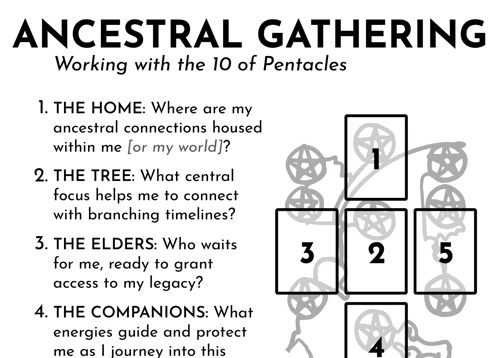Contents
- Introduction: The Intersection of Astrology and Tarot
- 1. Understanding the Basics of Astrology
- 2. Incorporating Astrological Correspondences in Tarot Readings
- 3. Astrological Tarot Spreads for Deeper Insight
- 4. Aligning Timing with the Celestial Clock
- 5. Enhancing Intuition with Astrological Symbolism
- Conclusion: Empower Your Tarot Readings with Astrological Insight
-
Frequently Asked Questions
- 1. How does astrology complement tarot readings?
- 2. Do I need to be an astrologer to incorporate astrology into my tarot practice?
- 3. How can assigning zodiac signs to tarot cards enhance a reading?
- 4. What role do planetary energies play in tarot interpretations?
- 5. How can house placements enhance the layout of a tarot reading?
- 6. What is the significance of lunar phases in tarot timing?
- 7. How can planetary retrogrades offer tarot guidance?
- 8. What are solar returns, and how can they be utilized in seasonal tarot readings?
- 9. How do the four elements relate to tarot interpretations?
- 10. How do sign rulerships enhance tarot card meanings?
- References
Introduction: The Intersection of Astrology and Tarot
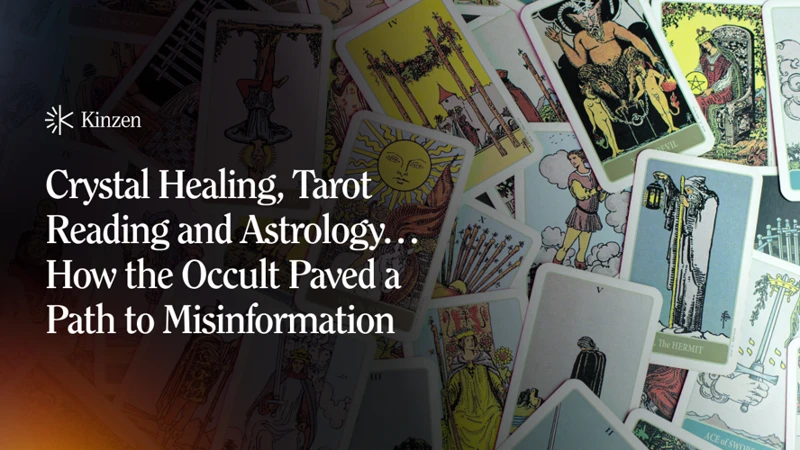
Astrology and Tarot are two powerful divinatory systems that have been used for centuries to gain insight into the past, present, and future. The combination of these two ancient practices can create a synergistic effect, enhancing the depth and accuracy of tarot readings. By tapping into the celestial influence of astrology, tarot readers can unlock a deeper understanding of the cards and their meanings. This article will explore the intersection of astrology and tarot, guiding you step-by-step on how to unleash the power of the stars in your tarot spreads.
Astrology and tarot share a common language of symbolism and interpretation. Both systems rely on archetypal imagery and intuitive insights to provide guidance and clarity. While astrology uses the positions of the planets and stars at a specific moment to interpret cosmic energies, tarot utilizes a deck of cards with its own unique symbolism and meanings. When these two practices are combined, they can offer a comprehensive and holistic approach to divination.
In the following sections, we will delve into the basics of astrology, including the zodiac signs, planets, and houses, to better understand their influence on tarot readings. We will then explore different ways to incorporate astrological correspondences in tarot spreads, such as assigning zodiac signs to tarot cards, connecting planetary energy to tarot interpretations, and utilizing house placements in reading layouts.
Additionally, we will discuss specific astrological tarot spreads that can provide deeper insight into various aspects of life, such as the Zodiac Spread, Planetary Guidance Spread, and House Focus Spread. These spreads allow us to explore hidden aspects, seek divine guidance, and delve into specific life domains.
We will explore how to align timing with the celestial clock, utilizing lunar phases, planetary retrogrades, and solar returns for tarot timing and guidance. Understanding the influence of these astrological events can add an extra layer of depth and precision to your readings.
Lastly, we will explore how astrology enhances intuition through its connection to the four elements, sign rulerships, and astrological aspects. By understanding the Tarot and the Four Elements, the significance of Sign Rulerships, and the relationship between Astrological Aspects and Tarot Interpretations, you can tap into a deeper well of insight and intuition in your tarot practice.
The intersection of astrology and tarot offers a powerful tool for self-discovery, personal growth, and divination. By incorporating astrological correspondences and symbolism, tarot readers can enhance their readings and unlock hidden depths of meaning. So, let’s embark on this journey of exploration, as we empower our tarot practice with the insights of the stars.
(Note: If you’re interested in understanding the connection between astrology, tarot, and numerology, you can check out our article on the Astrology, Tarot, and Numerology Connection for a more comprehensive understanding. Additionally, if you want to delve deeper into the significance of the Sun, Moon, and Rising signs in tarot readings, be sure to read our article on The Significance of Sun, Moon, and Rising in Tarot Readings.)
1. Understanding the Basics of Astrology
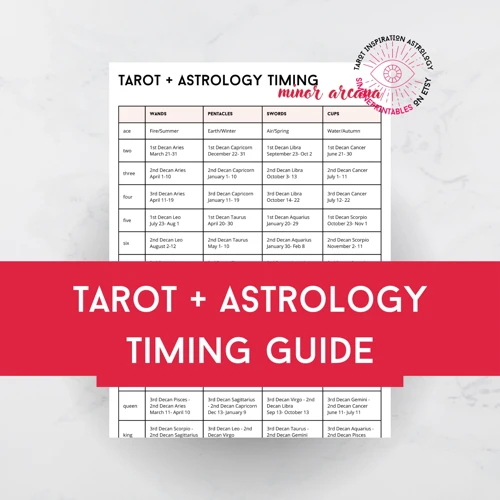
To delve into the basics of astrology is to unlock a profound understanding of the cosmic forces that shape our lives and the tarot readings we conduct. At the core of astrology are the zodiac signs, each associated with specific elements representing different energies and qualities. These signs can range from fiery Aries to watery Pisces, each holding unique characteristics and traits. In addition to the zodiac signs, astrology also invovles the planets, such as Mercury, Venus, and Mars, which influence different aspects of our lives and personalities. Understanding the influence of these celestial bodies can provide a deeper layer of insight when interpreting tarot cards. Astrology encompasses the concept of houses, which represent different life domains and highlight areas of focus in a tarot reading. By familiarizing yourself with the individual meanings of the houses, you can create more nuanced interpretations. The basics of astrology form a foundation from which tarot readers can glean greater depths of wisdom and understanding, enriching their tarot practice.
1.1 The Zodiac Signs and Their Associated Elements
The zodiac signs and their associated elements play a crucial role in astrology. Each zodiac sign is connected to one of the four elements: fire, earth, air, or water. These elements represent different energies, qualities, and attributes that shape the characteristics of each sign. Let’s explore each element and its corresponding zodiac signs:
1. Fire: Fire signs are passionate, enthusiastic, and dynamic. They embody the element of fire, which represents creativity, inspiration, and the driving force of transformation. The three fire signs are Aries, Leo, and Sagittarius. Aries is known for their pioneering spirit, Leo for their confident and charismatic nature, and Sagittarius for their adventurous and philosophical outlook.
2. Earth: Earth signs are grounded, practical, and dependable. They are associated with stability, reliability, and a strong connection to the physical world. The three earth signs are Taurus, Virgo, and Capricorn. Taurus is known for their sensual nature and love for beauty, Virgo for their analytical and detail-oriented approach, and Capricorn for their ambitious and disciplined mindset.
3. Air: Air signs are intellectual, communicative, and social. They are characterized by their analytical thinking, curiosity, and ability to adapt to different situations. The three air signs are Gemini, Libra, and Aquarius. Gemini is known for their versatility and quick wit, Libra for their harmonious and diplomatic nature, and Aquarius for their innovative and humanitarian mindset.
4. Water: Water signs are sensitive, intuitive, and deeply empathetic. They are associated with emotions, intuition, and spiritual growth. The three water signs are Cancer, Scorpio, and Pisces. Cancer is known for their nurturing and protective nature, Scorpio for their intense and transformative energy, and Pisces for their dreamy and compassionate outlook.
Understanding the zodiac signs and their associated elements offers valuable insights into the core characteristics and energies that shape individuals’ personalities and experiences. This knowledge can be applied to tarot readings by recognizing the elemental traits of the zodiac signs and their influence on the cards, creating a deeper and more comprehensive interpretation.
1.2 The Planets and Their Influence
The planets in astrology play a crucial role in shaping our personalities, actions, and life events. Each planet holds a unique energy and influence that can be key to understanding tarot readings. Let’s explore the significance of the planets and their influence on tarot interpretations.
– Sun: The Sun represents our basic self, our core essence, and our ego. It symbolizes vitality, individuality, and the quest for self-expression. In tarot, the Sun card often signifies success, happiness, and fulfillment.
– Moon: The Moon symbolizes our emotions, intuition, and subconscious mind. It governs our instincts and reflects our moods and desires. When the Moon appears in tarot readings, it often represents our inner world, dreams, and hidden emotions.
– Mercury: Mercury is associated with communication, intellect, and mental agility. It rules over thinking processes, logical reasoning, and the exchange of ideas. When Mercury influences a tarot reading, it can signify insight, communication, or the need for clear thinking.
– Venus: Venus represents love, beauty, and attraction. It governs our relationships, values, and sense of pleasure. In tarot, Venus brings messages of harmony, love, and emotional fulfillment.
– Mars: Mars is the planet of energy, passion, and action. It symbolizes our drive, ambition, and assertiveness. In tarot, the influence of Mars can indicate power, strength, and determination.
– Jupiter: Jupiter symbolizes expansion, growth, and abundance. It represents luck, opportunity, and wisdom. When Jupiter’s energy is present in tarot readings, it often signifies positive outcomes, success, and good fortune.
– Saturn: Saturn is associated with discipline, responsibility, and structure. It governs lessons, challenges, and limitations. In tarot, Saturn can signify hard work, perseverance, and the need for self-discipline.
– Uranus: Uranus represents innovation, individuality, and sudden changes. It is associated with liberation, revolution, and breaking free from conventions. The influence of Uranus in tarot can herald unexpected shifts, unconventional choices, or a need for freedom.
– Neptune: Neptune symbolizes spirituality, imagination, and dreams. It represents our connection to the divine and the realm of the unconscious. In tarot, Neptune’s presence can bring intuitive insights, spiritual growth, or a call to trust one’s inner wisdom.
– Pluto: Pluto governs transformation, power, and rebirth. It represents the process of deep personal growth and the shedding of old patterns. In tarot, Pluto’s energy can indicate intense changes, inner transformation, or the need for letting go of the past.
Understanding the influence of the planets in astrology allows tarot readers to incorporate these energies into their interpretations. By recognizing the planetary associations, readers can gain deeper insights into the themes and messages conveyed by the tarot cards. The planets in astrology help us unlock the power of the stars and harness their wisdom in our tarot readings.
1.3 The Houses and Their Meanings
The houses in astrology play a pivotal role in understanding different areas of life and their significance in tarot readings. In astrology, there are 12 houses, each representing distinct life domains and aspects of existence. These houses are like different rooms in a cosmic mansion, with each one holding its own unique meanings and influences.
1. The First House: This house represents the self, personal identity, and appearance. It sets the stage for the entire birth chart and lays the foundation for self-expression and individuality. When interpreting tarot cards associated with the first house, pay attention to themes of self-discovery, personal growth, and outward expression.
2. The Second House: This house relates to material possessions, financial stability, and personal values. It reflects our attitudes towards money, resources, and material abundance. When exploring tarot cards connected to the second house, consider themes of self-worth, financial growth, and the relationship between material and spiritual wealth.
3. The Third House: This house governs communication, learning, and short-distance travel. It reveals our intellectual curiosity, communication style, and mental agility. When examining tarot cards aligned with the third house, explore themes of learning, intellectual pursuits, and effective communication.
4. The Fourth House: This house represents the home, family, and roots. It symbolizes our childhood, ancestry, and emotional foundation. Tarot cards associated with the fourth house can illuminate matters of home, family dynamics, and emotional well-being.
5. The Fifth House: This house is linked to creativity, self-expression, romance, and children. It reveals our unique talents, artistic inclinations, and desire for joy and pleasure. When analyzing tarot cards tied to the fifth house, consider themes of creativity, self-confidence, and the pursuit of passion.
6. The Sixth House: This house governs health, daily routines, work, and service to others. It highlights our sense of duty, practical skills, and desire for a fulfilling work-life. Tarot cards affiliated with the sixth house can shed light on matters of health, routine, work ethics, and personal growth through service.
7. The Seventh House: This house is associated with relationships, partnerships, and marriage. It delves into our approach to one-on-one connections and our capacity for intimacy and cooperation. Tarot cards aligned with the seventh house can provide insights into relationships, love, and the dynamics of partnerships.
8. The Eighth House: This house pertains to transformation, shared resources, and deep connections. It delves into the mysteries of life, including birth, death, and rebirth. When exploring tarot cards linked to the eighth house, dive into themes of transformation, intimacy, and inner growth.
9. The Ninth House: This house is connected to higher education, spirituality, philosophy, and long-distance travel. It represents our search for meaning, spiritual growth, and expansion of knowledge. Tarot cards associated with the ninth house can illuminate themes of personal beliefs, philosophy, and spiritual exploration.
10. The Tenth House: This house governs career, ambitions, achievements, and public image. It symbolizes our professional aspirations, public reputation, and role in society. When examining tarot cards aligned with the tenth house, consider themes of career growth, ambition, and finding one’s place in the world.
11. The Eleventh House: This house relates to friendships, community involvement, and social networks. It signifies our collective aspirations, social connections, and ideals. Tarot cards associated with the eleventh house can provide insights into friendships, social networks, and our place within larger communities.
12. The Twelfth House: This house represents spirituality, subconscious mind, hidden matters, and retreat. It unveils our inner world, spiritual connection, and issues that are deeply buried or subconscious. Exploring tarot cards associated with the twelfth house can reveal insights into our spiritual journey, hidden influences, and the power of the subconscious mind.
Understanding the meanings of each house in astrology allows tarot readers to integrate these influences into their readings. By discerning which house(s) are relevant to a specific tarot spread, one can uncover deeper layers of interpretation and gain valuable insights into various aspects of life. The houses add another dimension to the tarot reading process, providing a comprehensive and encompassing understanding of the cosmic influences at play. With this knowledge, tarot practitioners can unlock the power of the houses, offering clients profound guidance and wisdom.
2. Incorporating Astrological Correspondences in Tarot Readings
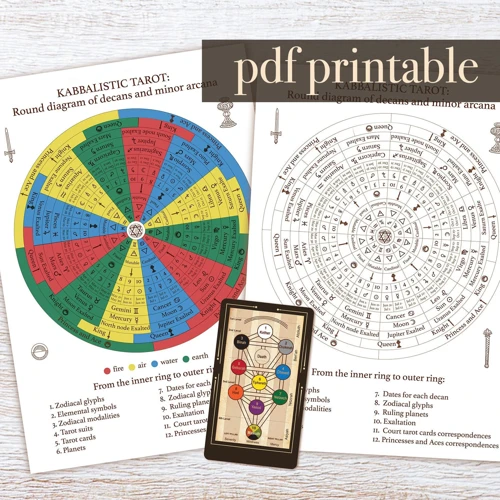
Incorporating astrological correspondences in tarot readings can elevate the depth and accuracy of interpretations, allowing us to tap into the cosmic energies that surround us. One way to do this is by assigning zodiac signs to tarot cards. For example, the Hierophant card can be associated with Taurus, highlighting themes of tradition, stability, and guidance. Connecting planetary energy to tarot interpretations is another powerful method. When drawing the Strength card, we can consider the influence of Mars, bringing forth courage, passion, and assertiveness. Utilizing house placements in reading layouts can provide valuable insights into specific areas of life. Placing the Empress card in the seventh house might suggest harmony and abundance in relationships. By incorporating these astrological correspondences, tarot readings become a dynamic and multi-dimensional experience, enabling us to unlock hidden layers of meaning and provide profound guidance for ourselves and others.
2.1 Assigning Zodiac Signs to Tarot Cards
Assigning zodiac signs to tarot cards is a fascinating technique that allows tarot readers to tap into the energies and characteristics associated with each sign. By connecting specific zodiac signs to certain tarot cards, a deeper layer of meaning and insight can be revealed during readings. The process of assigning zodiac signs to tarot cards involves drawing parallels between the symbolism of the cards and the qualities represented by the zodiac signs.
To begin, it’s important to analyze the imagery, symbolism, and overall themes of each tarot card. For example, The Magician card, with its focus on manifestation and personal power, aligns well with the zodiac sign of Aries, known for its assertiveness and leadership qualities. Justice, with its emphasis on fairness and balance, corresponds to Libra, the sign associated with harmony and justice.
The method for assigning zodiac signs to tarot cards can vary from reader to reader, but there are commonly recognized associations that can serve as a starting point. Here are some examples:
– The fiery and passionate zodiac sign of Leo can be connected to tarot cards that embody creative expression, self-confidence, and personal power. The Sun card, which represents vitality and self-expression, is often associated with Leo.
– Taurus, an earth sign known for its stability and practicality, can be linked to tarot cards that represent material abundance, sensuality, and grounded energy. The Empress card, with its themes of fertility and nurturing, aligns well with Taurus.
– The water sign of Cancer, associated with emotions, intuition, and empathy, can be linked to tarot cards that speak to themes of love, family, and emotional well-being. The High Priestess, with her deep connection to intuition and the subconscious, is often associated with Cancer.
By incorporating these zodiac correspondences into tarot readings, readers can gain additional insights into the cards’ meanings. For instance, if an individual pulls a card that corresponds to their zodiac sign, it may indicate that the energies of that sign are particularly prominent in their current situation or that they can draw upon those qualities for guidance.
While these associations can serve as a helpful guide, it’s important to remember that there is no universally agreed-upon system for assigning zodiac signs to tarot cards. Personal intuition and interpretation should always take precedence. Experimenting with different correspondences and listening to your own inner guidance can lead to unique and powerful insights in your tarot practice.
2.2 Connecting Planetary Energy to Tarot Interpretations
Connecting planetary energy to tarot interpretations is a powerful way to deepen the insight and guidance offered by tarot readings. Each planet in astrology is associated with specific energies, qualities, and archetypal meanings that can be mirrored in tarot cards. By understanding the correlations between planetary energy and tarot interpretations, tarot readers can unlock a wealth of additional symbolism and meaning.
Here is a breakdown of some key planets and their corresponding tarot interpretations:
1. **Mercury**: Known as the planet of communication and intellect, Mercury is associated with the tarot cards representing thought, communication, and mental processes. Cards such as The Magician and The Hermit can carry the energy of Mercury, emphasizing the need to use logic, reason, and effective communication in tarot readings.
2. **Venus**: This planet is often linked to matters of love, beauty, and relationships. Tarot cards such as The Empress and The Lovers can embody the energy of Venus, highlighting themes of love, harmony, and attraction. When these cards appear in a reading, they can indicate the importance of nurturing relationships and finding balance in matters of the heart.
3. **Mars**: Known for its association with action, passion, and assertiveness, Mars brings a fiery energy to tarot readings. Cards like The Tower and The Chariot can reflect the influence of Mars, urging individuals to take bold actions, harness their inner strength, and overcome obstacles.
4. **Jupiter**: Representing expansion, growth, and abundance, Jupiter’s energy can be found in cards such as The Wheel of Fortune and The Emperor. These cards often indicate opportunities for success, luck, and the potential for personal growth. When interpreting these cards, it is important to consider the influence of Jupiter and its potential for positive outcomes.
5. **Saturn**: Known as the planet of structure, discipline, and responsibility, Saturn’s energy can be reflected in cards like The World and The Judgement. These cards often signify the need for self-control, long-term planning, and facing the consequences of one’s actions. When these cards appear in a reading, they can indicate a period of learning from past experiences and taking responsibility for one’s life.
6. **Uranus, Neptune, and Pluto**: These three outer planets have a more generational influence, and their energies can be seen in the broader context of tarot readings. Uranus brings innovation, Neptune represents spirituality and intuition, and Pluto symbolizes transformation and rebirth. These planets can add depth and complexity to tarot interpretations by highlighting larger societal, spiritual, or transformative themes.
By understanding the connections between planetary energy and tarot interpretations, tarot readers can add layers of meaning and nuance to their readings. Incorporating these planetary influences allows for a richer understanding of the tarot cards and the messages they convey, providing clients with more comprehensive guidance and insight.
2.3 Utilizing House Placement in Reading Layouts
When it comes to tarot readings, the layout and arrangement of the cards play a significant role in interpreting their meanings. One powerful technique to enhance tarot readings is by utilizing the house placement in reading layouts. In astrology, the houses represent different life domains and areas of focus. Each house has its own unique theme and corresponds to specific aspects of our lives, such as career, relationships, spirituality, and more. By incorporating the concept of house placement in tarot spreads, we can gain deeper insights and uncover hidden dynamics within these areas.
To begin incorporating house placement, it’s essential to understand the meanings and themes associated with each house. The First House symbolizes the self, personal identity, and physical appearance. The Second House represents finances, possessions, and personal values, while the Third House relates to communication, learning, and siblings. The Fourth House relates to home, family, and roots, while the Fifth House pertains to creativity, self-expression, and romance.
Moving forward, the Sixth House encompasses work, routine, and health, while the Seventh House focuses on partnerships, both romantic and professional. The Eighth House delves into profound transformations and shared resources, while the Ninth House connects to travel, higher education, and spirituality. The Tenth House represents career, public image, and reputation, while the Eleventh House signifies friendships, social networks, and goals.
Lastly, the Twelfth House embodies introspection, subconscious, and spirituality. Once familiarized with the meanings of each house, you can incorporate this knowledge into tarot readings by placing relevant cards in the corresponding positions. For example, if exploring a question related to career or public image, placing a card in the Tenth House position can provide insights specifically tailored to that aspect of the querent’s life.
Incorporating house placement within a tarot spread creates a more detailed and nuanced reading experience. It allows us to examine specific areas of life and uncover the underlying influences that shape our experiences. By utilizing the astrological concept of house placement, tarot readers can gain a deeper understanding of the energies at play within different aspects of our lives and provide more accurate and insightful readings.
3. Astrological Tarot Spreads for Deeper Insight
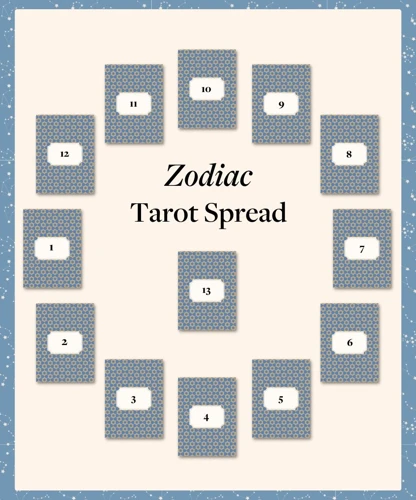
Astrological tarot spreads offer an extraordinary opportunity to dive deeper into the intricacies of our lives, unlocking profound insight and guidance. One such spread is the Zodiac Spread, which unveils hidden aspects by assigning each card to a specific zodiac sign. This spread allows us to explore different areas of our lives through the lens of astrology, providing a comprehensive and well-rounded reading. Another powerful spread is the Planetary Guidance Spread, where each card represents a specific planet and offers divine guidance for different aspects of our existence. By connecting with planetary energies, we can tap into higher wisdom and receive clear guidance. Additionally, the House Focus Spread enables us to explore specific life domains by assigning each card to a particular house. This spread allows us to delve deeper into different areas of our life, shedding light on relationships, career, or personal development. These astrological tarot spreads provide a broader and more nuanced perspective, offering unparalleled insights into our life’s journey and helping us make informed decisions.
The Zodiac Spread is a powerful tarot spread that utilizes the symbolism of the zodiac signs to uncover hidden aspects of a situation or individual. This spread consists of twelve cards, each representing one of the zodiac signs. It is best used when seeking insight into various aspects of life, such as relationships, career, or personal growth.
To perform the Zodiac Spread, you will need a deck of tarot cards and a quiet space for reflection. Begin by shuffling the cards while focusing on the specific area or question you want to explore. Once you feel ready, lay out the cards in a circular pattern, with each card representing a zodiac sign.
Starting with the first card, which represents Aries, position it at the 9 o’clock position on the table. Moving clockwise, place the subsequent cards in their corresponding zodiac sign positions. The last card, representing Pisces, will be placed at the 8 o’clock position to complete the circle.
Now, it’s time to interpret the cards in relation to their zodiac sign placements. Each card will provide insight into a specific aspect of your question or situation, influenced by the energy and qualities associated with the corresponding zodiac sign.
For example, if you drew The Lovers card for Gemini, it could represent a dynamic relationship or a choice you need to make in your love life. The Strength card for Leo might indicate a need for courage and inner strength in a situation related to self-expression or leadership.
Pay attention to the interactions between the cards as well. Is there a harmonious flow or a challenging dynamic? This can provide further insight into the nature of the energies at play.
Take your time to contemplate each card and its position, allowing your intuition to guide you in deciphering their meanings. Record your interpretations in a journal or notebook for future reference.
The Zodiac Spread offers a unique way to explore the hidden aspects of a situation or individual, drawing on the rich symbolism of the zodiac signs. It can provide a deeper understanding and offer guidance for navigating various areas of life. So, harness the power of the zodiac and embark on a journey of uncovering truths and revealing hidden potentials with the Zodiac Spread.
3.2 The Planetary Guidance Spread: Seek Divine Guidance
The Planetary Guidance Spread is a powerful tarot spread that allows you to seek divine guidance and insight by tapping into the energy and influence of the planets. This spread is particularly useful when you have a specific question or situation that you need guidance on, and you want to understand the planetary forces at play.
To perform the Planetary Guidance Spread, follow these steps:
1. Select and lay out your tarot cards: Begin by selecting a significator card to represent yourself or the querent in the reading. Then, shuffle and spread the tarot deck face-down, allowing your intuition to guide you in selecting seven cards. Each card will represent a different planet and its influence.
2. Assign the planets to the cards: Assign one card to each of the seven celestial bodies: the Sun, Moon, Mercury, Venus, Mars, Jupiter, and Saturn. If you prefer, you can use correspondences from astrology to determine which cards align with each planet. For example, the Sun can be represented by a card associated with vitality, success, and self-expression, such as the Sun card in the tarot deck.
3. Interpret the cards: Starting with the significator card, reveal each card one by one, placing it in its designated position. Interpret the meaning of each card in relation to its corresponding planet and its influences. Consider the traditional associations of the planets, such as the Sun representing energy and vitality, the Moon symbolizing emotions and intuition, and so on. Pay attention to the energies and guidance each planet offers within the context of your question or situation.
4. Analyze and synthesize the messages: Once all the cards have been revealed and interpreted, step back and take a holistic view of the spread. Look for patterns, connections, and insights that emerge from the combination of the planetary influences. Consider how these influences intersect and interact with each other, offering a nuanced understanding of the guidance being provided.
5. Reflect and integrate: Take time to reflect on the messages and guidance received. Consider how this divine insight can be applied to your current circumstances or question. Use this knowledge to make informed decisions, gain clarity, and seek spiritual guidance as needed.
The Planetary Guidance Spread is a powerful tool for seeking divine guidance and connecting with the energies of the planets. It provides a deeper understanding of the celestial influences at play and offers profound insights into your life’s journey. By incorporating this spread into your tarot practice, you can unlock a deeper level of wisdom and connection with the divine.
3.3 The House Focus Spread: Explore Life Domains
The House Focus Spread is a powerful tool that allows tarot readers to explore specific life domains and gain deeper insights into different areas of a person’s life. This spread is based on the concept of houses in astrology, which represent different aspects of life such as love, career, relationships, or spirituality. By using the House Focus Spread, tarot readers can tailor their readings to focus on a particular area of interest or concern.
To perform the House Focus Spread, begin by shuffling your tarot deck and setting your intention to gain clarity and guidance on a specific life domain. Once you feel ready, draw a card to represent each house in the spread. You can refer to an astrology reference or use a pre-determined correspondences chart to assign the houses to specific tarot cards.
Next, lay out the cards in a spread that resembles the layout of a house. You can draw a diagram on a piece of paper or visualize the layout in your mind. Place the cards in their corresponding positions, with the first card representing the first house, the second card representing the second house, and so on.
Once the cards are laid out, begin interpreting each card in relation to the corresponding house. Pay attention to the symbolism, imagery, and meanings of the tarot cards as they relate to the specific life domain associated with the house. The cards will provide insights, guidance, and potential opportunities or challenges within that particular area of life.
For example, if the second house represents finances and abundance, the card drawn for that position may reveal information about the querent’s financial situation, their attitudes towards money, or any potential financial opportunities or challenges they may face. Similarly, if the seventh house represents relationships, the card drawn for that position can provide insights into the querent’s love life, partnerships, or any issues that may arise in their relationships.
When interpreting the House Focus Spread, pay attention to the interactions between the cards and how they relate to one another. Consider the overall picture that emerges from the spread and note any patterns or recurring themes. This will provide a comprehensive understanding of the specific life domain and shed light on the querent’s circumstances, strengths, and areas for growth.
The House Focus Spread is a versatile and insightful tool that allows tarot readers to explore the various aspects of a person’s life in-depth. It provides a framework for exploring specific life domains, fostering a more focused and tailored tarot reading experience. By utilizing the House Focus Spread, tarot readers can provide valuable guidance and shed light on the querent’s journey within specific areas of life.
4. Aligning Timing with the Celestial Clock
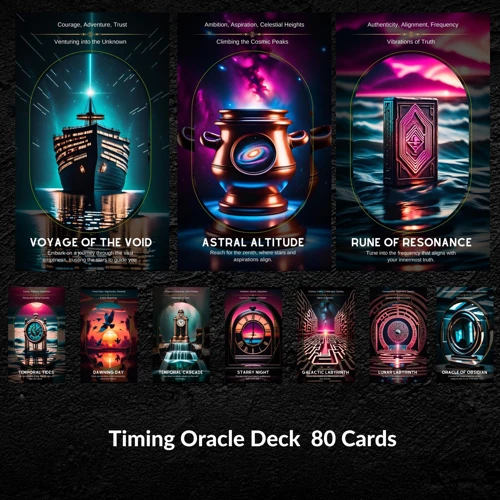
Aligning timing with the celestial clock is a powerful technique that can add an extra layer of precision and guidance to tarot readings. One aspect to consider is the lunar phases, which hold their own unique energy and symbolism. The waxing and waning of the moon can influence the timing of events and provide insight into the current phase of a situation. Additionally, planetary retrogrades, such as Mercury retrograde, can impact communication, clarity, and decision-making. By understanding and taking into account these retrograde periods, tarot readers can offer guidance on navigating challenges and making the most of opportunities. Another key element is the concept of solar returns and seasonal readings, where the positioning of the sun at the time of a person’s birthday can offer insight into the year ahead. By aligning tarot readings with these celestial events, readers can tap into the energetic currents of the universe and offer more accurate and timely guidance. So, by incorporating the timing of lunar phases, planetary retrogrades, and solar returns, tarot practitioners can unlock a deeper understanding of the celestial influences that shape our lives.
4.1 Lunar Phases and Tarot Timing
The lunar phases have long been associated with cycles of change, growth, and reflection. In the realm of tarot, understanding the influence of lunar phases can greatly enhance the timing and accuracy of readings. Each phase of the moon – from the New Moon to the Full Moon and everything in between – carries its own unique energy and symbolism.
When incorporating lunar phases into tarot timing, the New Moon is often seen as a time of new beginnings, fresh starts, and planting seeds for the future. It represents a period of intention setting and manifestation. During this phase, tarot readings can focus on identifying goals and setting intentions for the lunar cycle ahead. Cards like The Fool or The Magician can be particularly relevant during this time, as they signify new journeys and the power of manifestation.
As the moon begins to wax and move towards the Full Moon, the energy shifts towards growth, expansion, and abundance. This is a time when the intentions set during the New Moon start to come to fruition. Tarot readings during this phase can offer insights into progress, opportunities, and the fulfillment of desires. Cards like The Emperor or The Wheel of Fortune can symbolize the momentum and positive change that comes with this phase.
The Full Moon is a powerful time for divination, as it represents illumination and heightened emotions. This phase is ideal for gaining clarity, tapping into intuition, and releasing what no longer serves us. Tarot readings during the Full Moon can provide deep insights, revealing hidden truths and offering guidance for transformative change. Cards like The High Priestess or The Moon can be particularly significant during this phase, as they signify deep intuition and accessing one’s inner wisdom.
As the moon wanes and moves towards the New Moon again, the energy becomes more introspective, focused on releasing, letting go, and tying up loose ends. This phase is perfect for reflection, forgiveness, and introspection. Tarot readings during this time can help uncover patterns or behaviors that no longer serve us and provide guidance for healing and growth. Cards like The Death or The Hanged Man can symbolize the transformative and releasing energy of this phase.
By aligning tarot readings with the different phases of the moon, you can tap into the natural rhythms of the universe, enhancing the timing and insight of your readings. The lunar phases act as a cosmic clock, guiding us on the journey of self-discovery and empowering us to make decisions in alignment with the cycles of life. So, the next time you conduct a tarot reading, consider the lunar phase as a powerful tool for timing and guidance.
4.2 Planetary Retrogrades and Tarot Guidance
Planetary retrogrades hold significant influence in astrology, and understanding their impact can provide valuable insights in tarot readings. During a retrograde, a planet appears to move backward in its orbit from our perspective on Earth. This phenomenon is believed to intensify the energy of the planet, affecting various aspects of our lives. When a planet is in retrograde, its energy may become more introspective, disruptive, or transformative.
When incorporating planetary retrogrades into tarot guidance, it is essential to consider the qualities and symbolism associated with the planet involved. For example, when Mercury is retrograde, communication, technology, and travel may be affected. This can bring about miscommunication, delays, or the need for reassessment in these areas of life. Tarot cards such as The Magician, The Tower, and The Wheel of Fortune may resonate strongly during this time.
Each planetary retrograde has its unique qualities and effects. For instance, Venus retrograde can influence matters of love, relationships, and self-worth. This retrograde period can bring about introspection, reevaluation of values, and potential challenges or transformations in personal connections. Tarot cards like The Lovers, The Empress, and The Devil may carry heightened significance during this time.
When a retrograde period aligns with a tarot reading, the cards drawn can reflect the energies associated with that specific planetary retrograde. Reversed cards or those that typically symbolize disruption, change, or introspection may hold even greater weight during retrograde periods. It is crucial to consider the context and position of these cards within the reading to gain a comprehensive understanding of the guidance they provide.
By incorporating the influence of planetary retrogrades into your tarot readings, you can tap into the energy of the cosmos and gain deeper insights into the challenges, lessons, and transformations that may be present in your life. Understanding the symbolism and qualities associated with each retrograde period allows you to provide more nuanced and accurate guidance to yourself and those seeking tarot guidance. Truly, planetary retrogrades offer a wealth of knowledge and subtleties that can enhance the power of tarot guidance.
4.3 Solar Returns and Seasonal Readings
Solar returns and seasonal readings are powerful techniques in astrology that can be incorporated into tarot practice to gain deeper insight and guidance. A solar return is a chart that is cast for the exact moment the Sun returns to its natal position each year, which marks your birthday. This chart provides a snapshot of the upcoming year, highlighting key themes, opportunities, and challenges that may arise. By overlaying tarot cards onto the solar return chart, you can gain a deeper understanding of the energies at play and receive guidance on how to navigate the year ahead.
Seasonal readings, on the other hand, focus on the changing seasons and the corresponding astrological shifts that occur throughout the year. Each season brings its own unique energy and qualities, and by drawing tarot cards influenced by these seasonal energies, you can gain insights specific to that time of year. For example, during the spring equinox, a tarot reader may focus on themes of rebirth, growth, and new beginnings. Conversely, during the winter solstice, the emphasis may be on introspection, reflection, and slowing down.
By incorporating solar returns and seasonal readings into your tarot practice, you can align your readings with the celestial cycles and tap into the broader cosmic energies at play. This can offer a deeper understanding of the timing and context of the guidance provided by the tarot cards. Whether it’s gaining insight into upcoming opportunities, navigating challenges, or embracing the transformative power of the seasons, solar returns and seasonal readings can enhance the depth and accuracy of your tarot practice. So, harness the power of the stars and seasons to unlock a whole new level of guidance and wisdom in your tarot readings.
5. Enhancing Intuition with Astrological Symbolism
Enhancing intuition with astrological symbolism is a powerful way to deepen the connection between tarot and the cosmic energies at play. The four elements—fire, earth, air, and water—play a significant role in both astrology and tarot, representing different aspects of the human experience. By understanding the elemental associations of each tarot suit and their corresponding zodiac signs, tarot readers can tap into a wealth of intuitive insight. Additionally, the concept of sign rulerships links specific tarot cards to different zodiac signs, granting them added significance and meaning in readings. Exploring astrological aspects, such as conjunctions, squares, and oppositions, provides a framework for understanding the dynamic relationships between tarot cards and the energetic interplay of the planets. Harnessing the power of astrological symbolism in your tarot practice can unlock a deeper intuitive understanding, enriching the reading experience for both the reader and the querent.
5.1 Tarot and the Four Elements
In tarot, the four elements – Fire, Water, Air, and Earth – play a significant role, representing different aspects of our lives and personalities. Each element holds its own unique energy and symbolism that can be applied when interpreting tarot cards. Let’s explore how the four elements enhance tarot readings:
1. Fire (Wands or Staves): Fire represents passion, creativity, and motivation. It symbolizes action, ambition, and the spark that ignites our desires. Tarot cards associated with Fire often depict scenes of growth, determination, and enthusiasm. When Fire energy appears in a reading, it signifies a call to action, the pursuit of goals, and embracing one’s passions.
2. Water (Cups): Water represents emotions, intuition, and the subconscious. It symbolizes our emotional well-being, relationships, and the depths of our inner emotional landscape. Tarot cards associated with Water often depict scenes of love, compassion, and introspection. When Water energy is present in a reading, it indicates the need for emotional healing, deep connection, and intuitive understanding.
3. Air (Swords): Air represents intellect, communication, and the realm of thoughts and ideas. It symbolizes mental clarity, logic, and the power of the mind. Tarot cards associated with Air often depict scenes of intellect, decision-making, and conflict resolution. When Air energy emerges in a reading, it suggests the need for critical thinking, clear communication, and the ability to overcome challenges through mental agility.
4. Earth (Pentacles or Coins): Earth represents practicality, stability, and material aspects of life. It symbolizes abundance, resources, and our physical connection to the world around us. Tarot cards associated with Earth often depict scenes of prosperity, grounding, and practicality. When Earth energy is present in a reading, it signifies the need for financial stability, nurturing relationships, and embodying the physical aspects of our existence.
By understanding the symbolism and energy associated with the four elements, tarot readers can add depth and nuance to their interpretations. The elements provide a framework for understanding the various aspects of life and the human experience. Incorporating this knowledge into your tarot practice can help you unravel the intricate layers of meaning within the cards, providing deeper insights and guidance for yourself and others. So, embrace the power of the four elements and let them guide you through the labyrinth of the tarot.
5.2 Sign Rulerships and Tarot Card Meanings
Sign rulerships play a significant role in astrology and can be a valuable tool for tarot readers looking to deepen their understanding of card meanings. Each zodiac sign is ruled by a specific planet, which influences the energy and characteristics associated with that sign. Understanding these sign rulerships can offer insights into the tarot card meanings and provide a layer of depth in readings.
For example, the fiery sign of Aries is ruled by Mars, the planet of action and assertiveness. When a tarot card with Aries energy, such as the Emperor, appears in a reading, it signifies a sense of leadership, ambition, and assertiveness. The influence of Mars adds a dynamic and courageous energy to the interpretation.
Similarly, the grounded sign of Taurus is ruled by Venus, the planet of love and beauty. When a tarot card with Taurus energy, like the Empress, appears, it represents abundance, sensuality, and harmony. The influence of Venus brings a nurturing and sensual energy to the interpretation.
These sign rulerships allow tarot readers to tap into the specific energies and qualities associated with each zodiac sign, enriching their interpretation of the cards and adding depth to their readings. By understanding the planetary influence and connecting it to the tarot card meanings, readers can provide more nuanced and profound insights for their clients.
It’s important to note that while sign rulerships can offer valuable guidance, they are not the sole determining factor for tarot interpretations. Tarot cards are multi-layered and can have various meanings depending on the context of the reading. Sign rulerships serve as a helpful tool to enhance understanding, but intuition and intuition should always be the primary focus in tarot readings.
Incorporating sign rulerships into your tarot practice can unlock deeper insights and provide greater clarity and resonance in your readings. The connection between astrology and tarot enables a synergistic approach to divination, expanding the potential for guidance and spiritual growth. By exploring the sign rulerships and their influences on tarot card meanings, you can unlock a new level of wisdom and understanding in your tarot practice.
5.3 Astrological Aspects and Tarot Interpretations
Astrological aspects play a crucial role in understanding the dynamics between different celestial bodies and how they influence our lives. These aspects, which are the angles formed between planets, can add depth and nuance to tarot interpretations. Each aspect carries its own unique energy and significance, providing additional layers of meaning when interpreting tarot cards.
One common aspect is the conjunction, which occurs when two planets are in close proximity to each other. This aspect signifies a blending and merging of energies, often symbolizing new beginnings, partnerships, or a focus on self-discovery. In a tarot spread, a conjunction aspect could be represented by cards that indicate unity, collaboration, or the need for balance.
Another aspect is the opposition, which occurs when two planets are directly across from each other in the sky. This aspect highlights polarities and tensions, reflecting areas of conflict, balancing opposing forces, or seeking integration. In tarot interpretations, cards representing opposing ideas or contrasting energies may arise, indicating the need to find a harmonious resolution.
The trine aspect represents a harmonious flow of energy between two planets, symbolizing ease and natural talents. This aspect often indicates favorable circumstances or the potential for personal growth. In tarot readings, cards representing creativity, abundance, or personal fulfillment may align with the trine aspect, offering guidance and encouragement.
The square aspect, on the other hand, depicts a challenging and dynamic energy. It signifies tension, obstacles, and the need for growth through struggle. Tarot cards that align with the square aspect may indicate the need for perseverance, the importance of addressing conflicts, or making necessary changes to overcome hurdles.
Lastly, the sextile aspect represents opportunities and positive connections. This aspect signifies supportive and flowing energies that can lead to favorable outcomes. In tarot readings, cards aligned with the sextile aspect may indicate the potential for new beginnings, fortunate circumstances, or beneficial partnerships.
Understanding the astrological aspects adds depth and insight to tarot interpretations. When examining tarot spreads, paying attention to the aspects between cards can create a more comprehensive picture and enable a more accurate and nuanced reading. By incorporating the influence of astrological aspects in tarot readings, you can unleash the power of celestial energies and gain a deeper understanding of the tarot’s messages.
Conclusion: Empower Your Tarot Readings with Astrological Insight
Incorporating astrological insight into your tarot readings can greatly enhance the depth and accuracy of your interpretations. By understanding the basics of astrology, including the zodiac signs, planets, and houses, you gain a deeper understanding of the energies at play in the tarot cards. Assigning zodiac signs to tarot cards, connecting planetary energy to interpretations, and utilizing house placements in reading layouts can provide a more comprehensive and nuanced reading experience. Astrological tarot spreads, such as the Zodiac Spread, Planetary Guidance Spread, and House Focus Spread, offer deeper insight into hidden aspects, divine guidance, and specific life domains. Aligning timing with celestial events, such as lunar phases, planetary retrogrades, and solar returns, allows for more precise and meaningful readings. Incorporating astrological symbolism, such as the four elements, sign rulerships, and astrological aspects, enhances intuition and adds another layer of depth to your interpretations. By blending the knowledge and wisdom of astrology with the intuitive power of tarot, you can truly empower your tarot readings and gain a deeper understanding of yourself and the world around you. So, go forth and unleash the power of the stars in your tarot practice!
Frequently Asked Questions
1. How does astrology complement tarot readings?
Astrology complements tarot readings by providing additional layers of symbolism, cosmic influences, and insights into the energies at play. It can enhance the interpretation of tarot cards, offering a deeper understanding of the situation and guiding the reader to provide more accurate and meaningful guidance.
2. Do I need to be an astrologer to incorporate astrology into my tarot practice?
No, you don’t need to be an expert astrologer to incorporate astrology into your tarot practice. Familiarizing yourself with the basics of astrology, such as the zodiac signs, planets, and houses, can greatly enhance your tarot readings. You can gradually deepen your knowledge and understanding of astrology as you continue combining it with tarot.
3. How can assigning zodiac signs to tarot cards enhance a reading?
Assigning zodiac signs to tarot cards can add another layer of meaning and interpretation. It allows you to draw upon the characteristics and energies associated with each zodiac sign, providing insights into the underlying influences that may be affecting the situation depicted in the cards.
4. What role do planetary energies play in tarot interpretations?
Planetary energies bring specific qualities and influences into tarot interpretations. Each planet has its own symbolism and characteristics that can be connected to the meaning of tarot cards. For example, the planet Venus can represent love, harmony, and relationships, which can provide valuable insights when interpreting cards related to these themes.
5. How can house placements enhance the layout of a tarot reading?
House placements in astrology represent different areas of life, such as love, career, or home environment. By incorporating house placements into tarot readings, you can gain a deeper understanding of the specific life domains that are being influenced by the cards. This can add more context and insight to the reading.
6. What is the significance of lunar phases in tarot timing?
Lunar phases, such as the New Moon or Full Moon, can be used to align timing in tarot readings. Each lunar phase has its own energy and symbolism, which can influence the interpretation of the cards. By considering the lunar phase, you can gain a better understanding of the current energetic climate and its impact on the reading.
7. How can planetary retrogrades offer tarot guidance?
Planetary retrogrades represent periods of introspection, reflection, and revisiting past experiences. When incorporating planetary retrogrades into tarot readings, you can explore unresolved issues, lessons to be learned, and areas that may require reassessment. This can provide valuable guidance in navigating challenges or making important decisions.
8. What are solar returns, and how can they be utilized in seasonal tarot readings?
Solar returns occur when the Sun returns to the exact position it occupied at the time of your birth. They mark the beginning of a new cycle and offer insights into the upcoming year. By incorporating solar returns into tarot readings, you can gain a deeper understanding of the themes, lessons, and opportunities that may arise during a specific season.
9. How do the four elements relate to tarot interpretations?
The four elements (Fire, Water, Air, and Earth) have a strong connection to tarot cards and their meanings. Each element represents different aspects of life and personality traits. By understanding the elemental associations, you can gain a deeper understanding of the energy, emotions, and qualities expressed in the cards.
10. How do sign rulerships enhance tarot card meanings?
Sign rulerships in astrology connect zodiac signs with specific planets. These connections can provide additional insights into the meanings of tarot cards. For example, if a card is associated with a particular zodiac sign and its ruling planet, you can consider the traits, energies, and influences of both in your interpretation.
